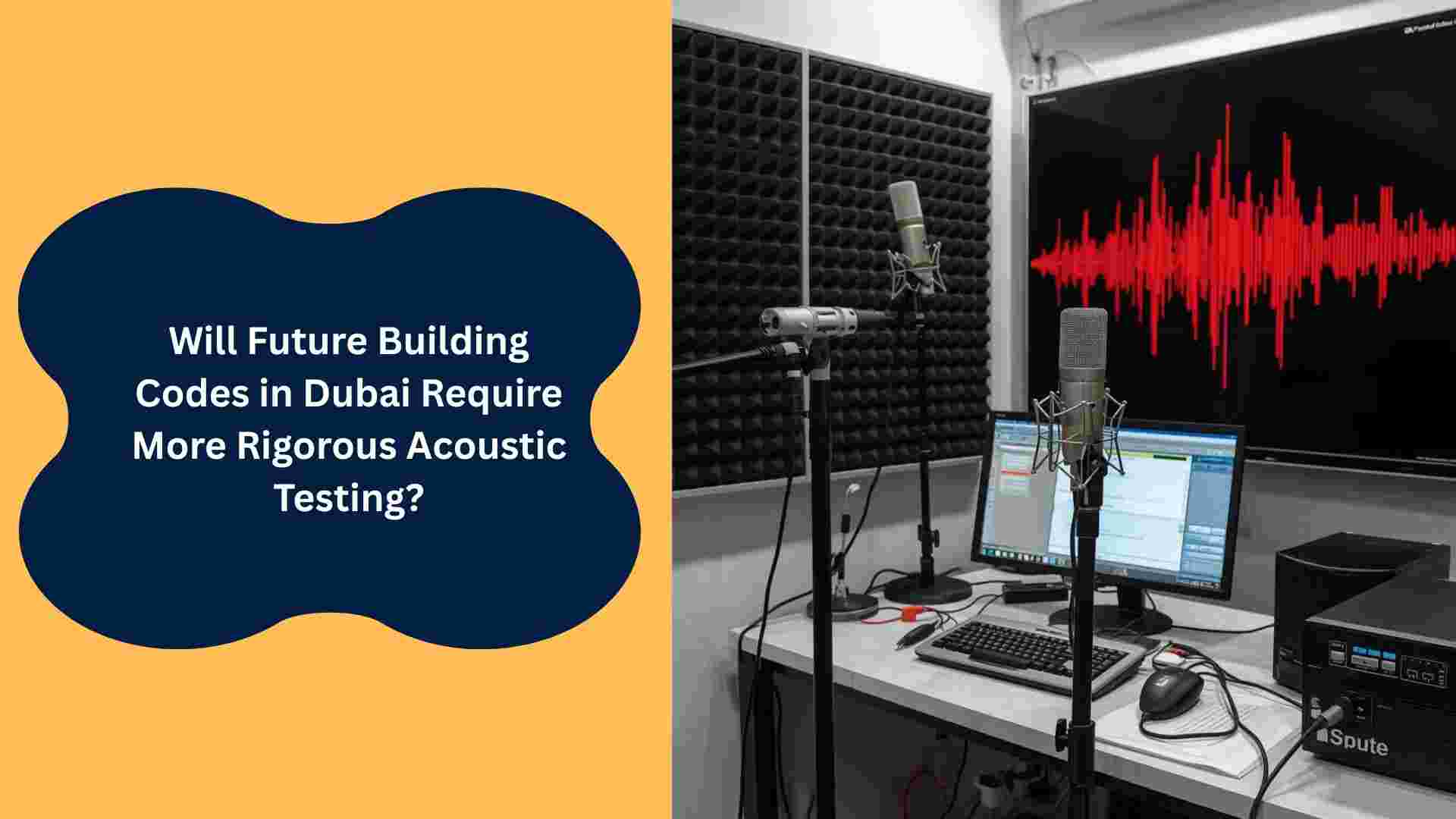Will Future Building Codes in Dubai Require More Rigorous Acoustic Testing?

Introduction
As Dubai continues to expand upward and outward, the city’s architecture has evolved into a symbol of precision, innovation, and global ambition. But with growth comes a less glamorous challenge—noise. The rise of high-density living, mixed-use developments, and rapid infrastructure expansion has amplified the need for acoustic comfort. The question many in the industry are now asking is: will future building codes demand stricter sound performance standards?
The answer may be yes. Around the world, regulations governing acoustic performance are tightening, and Dubai is poised to follow that trajectory. While today’s codes provide general guidance, tomorrow’s may well introduce new benchmarks, comprehensive testing requirements, and more accountability for developers and contractors. For professionals involved in Acoustic Testing Dubai, these shifts could reshape how projects are planned, approved, and delivered.
The Growing Relevance of Acoustic Standards
From Aesthetic Perfection to Sensory Comfort
Dubai’s architecture has long prioritized visual appeal—towering glass façades, luxury interiors, and advanced engineering. But true comfort extends beyond what meets the eye. The city’s cosmopolitan residents expect peace and privacy even in its busiest districts, pushing developers to consider how their projects sound, not just how they look.

Global Influence on Local Codes
In regions such as the European Union and North America, acoustic testing has been codified within building regulations for years. Requirements specify acceptable sound insulation between rooms, impact noise limits, and maximum background noise levels. Dubai’s authorities, known for aligning with international best practices, are increasingly studying these frameworks to strengthen local standards.
As sustainability and livability take center stage, it’s no longer enough for buildings to be energy-efficient—they must also be acoustically efficient.
Where Current Dubai Codes Stand
Existing Sound Control Provisions
Dubai Municipality currently addresses noise and vibration through environmental health and building guidelines. These rules set permissible noise levels for different zones—residential, commercial, or industrial. However, most are aimed at controlling external noise pollution rather than verifying internal acoustic quality.
That’s why many developers voluntarily turn to specialized consultants for in-depth Acoustic Testing Dubai services. These professionals conduct on-site evaluations of walls, floors, façades, and mechanical systems to ensure that the building performs beyond the minimum requirements.

The Limitations of Current Regulations
At present, most codes focus on compliance rather than comfort. They set acceptable thresholds, but they don’t yet enforce testing protocols for every project type. In practice, acoustic performance is often checked only for high-end developments or hospitality projects where brand standards demand silence.
This leaves a gap—many mid-range or residential developments are built without proper post-construction acoustic validation. It’s a gap regulators are likely to close in coming years.
NOTE : Looking for reliable Acoustic Testing Dubai solutions? DBZ Acoustical Consultants offers professional noise evaluation and sound insulation testing for residential, commercial, and industrial projects. Optimize your space with expert acoustic analysis—reach out now for precise results and improved building performance.
Why Stricter Codes Are Inevitable
1. Rising Urban Density
As population density increases, so does the potential for noise conflicts. Shared walls, connected plumbing systems, and centralized HVAC units all transmit sound between spaces. To ensure healthy living environments, new codes may introduce mandatory acoustic separation values for multi-unit buildings.
2. Global Real Estate Competitiveness
Dubai competes with global property markets where acoustic comfort is now a key selling point. Cities such as London, Sydney, and Singapore have long implemented detailed sound insulation testing in their building codes. To maintain its reputation for quality, Dubai will likely align its construction standards with these international benchmarks.
3. Health and Well-being Priorities
Research increasingly links chronic noise exposure to stress, sleep disruption, and reduced productivity. As Dubai integrates more wellness-based certification systems—like WELL and LEED—future codes may require acoustic testing as part of health compliance, not just environmental assessment.
4. Technological Readiness
Modern testing tools have made sound measurement more precise, faster, and less invasive. With equipment such as sound intensity probes and digital analyzers, inspectors can evaluate buildings efficiently. This means regulators can realistically mandate testing without creating bottlenecks for developers.
The Likely Shape of Future Regulations
Mandatory Testing for Occupancy Approval
One foreseeable development is the introduction of mandatory acoustic verification before a building receives its final occupancy certificate. This would mirror systems in Europe, where builders must submit verified sound insulation test reports before approval.
Categorized Sound Ratings
Developers may soon need to disclose sound insulation ratings, much like energy efficiency labels. A “Category A” apartment, for example, could promise exceptional noise control, while a “Category C” might meet minimum standards. Such transparency could influence buyer decisions and raise the bar for quality construction.
Integration with Smart City Frameworks
As Dubai advances its Smart City agenda, acoustic monitoring could become part of real-time environmental analytics. Buildings might integrate sensors that continuously track sound levels and transmit data to regulatory dashboards—making compliance dynamic rather than one-time.
Enhanced Training and Certification
With new codes comes the need for certified professionals. Acoustic engineers, technicians, and inspectors may need formal accreditation to conduct tests and interpret results. This would professionalize the field and ensure consistency across projects.
Lessons from International Benchmarks
The UK and EU Approach
In the United Kingdom, Building Regulations Part E mandates specific airborne and impact sound insulation standards for new and converted dwellings. Testing is compulsory, and results must meet defined decibel limits. Non-compliance can delay occupancy and impact project valuation.
Australia’s Building Code
Australia’s National Construction Code specifies acoustic performance standards for apartments and hotels. It even details acceptable testing procedures, ensuring a uniform baseline for all developers.
What Dubai Can Adapt
Dubai doesn’t need to reinvent the wheel—it can refine global best practices to suit local climate and construction methods. For instance, façade testing in Dubai must consider intense temperature variations, which affect material behavior and acoustic sealing.
The Role of Developers and Consultants
Shifting from Compliance to Commitment
Forward-thinking developers aren’t waiting for new laws—they’re already investing in better sound performance. High-end residential and hospitality brands recognize that acoustic comfort is part of the luxury experience. By conducting acoustic testing proactively, they future-proof their properties against stricter regulations.
Collaboration is Key
Consultants and contractors will need to work closer than ever. From early-stage design modeling to on-site testing, collaboration ensures sound control isn’t an afterthought. Integrating acoustic considerations at the architectural stage is more cost-effective than retrofitting after completion.
The Economic Case for Rigorous Testing
Some may view additional acoustic requirements as costly. But the long-term economics tell a different story. Buildings with verified acoustic comfort experience fewer complaints, lower renovation costs, and higher tenant retention.
For developers, the return on investment comes through reduced post-construction disputes and enhanced brand reputation. Buyers and tenants increasingly value quiet, private spaces—a trend that translates directly into higher market demand.
The Cultural Shift Toward Sound Awareness
Dubai’s evolving lifestyle has made people more attuned to sound quality. Cafés, offices, and residences now prioritize acoustics alongside lighting and temperature. The city’s creative and corporate communities—especially those working remotely or in open spaces—expect environments that support focus and calm.
This cultural shift is quietly influencing how the industry views noise. What was once dismissed as background is now recognized as a measurable design element.
Conclusion
Dubai’s building landscape is entering a new era—one where silence and sound balance are as important as structural strength or energy efficiency. The likelihood of more rigorous acoustic testing being integrated into future building codes is not just possible—it’s practical and necessary.
As expectations for comfort and quality rise, developers who embrace acoustic excellence today will stand ahead of tomorrow’s regulations. The city’s future buildings will not only reflect innovation in form and function but also harmony in sound.
- Art
- Causes
- Crafts
- Dance
- Drinks
- Film
- Fitness
- Food
- Oyunlar
- Gardening
- Health
- Home
- Literature
- Music
- Networking
- Other
- Party
- Religion
- Shopping
- Sports
- Theater
- Wellness



